
As more states legalize cannabis for medical and recreational drug use, people are starting to use the substance more than before. About 18% of Americans have used cannabis at least once, while 30% of people who use marijuana are addicted to the drug. Like any other kind of drug abuse, marijuana addiction can drastically impact a person’s quality of life.
One of the more challenging things about marijuana addiction treatment is the common misconception that cannabis isn’t harmful or addicting. However, marijuana can be physically and psychologically addicting and is often abused. Learn more about how marijuana abuse affects the body and why treatment for marijuana addiction is so important.
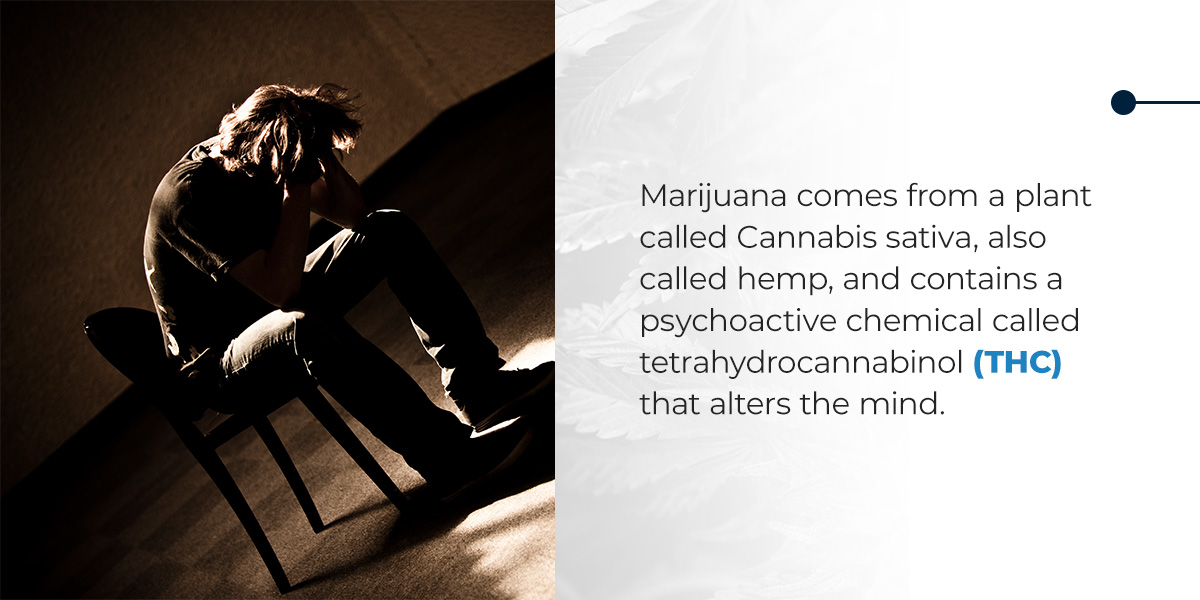
Known informally as marijuana, weed, pot, herb or grass, cannabis is a Schedule I substance. The federal government considers the drug to have no accepted medical applications but a high risk of misuse and addiction. However, some states have legalized marijuana for medical purposes and others for recreational use. While some doctors may prescribe medical marijuana for specific conditions or ailments, there’s no clinical evidence to prove that the benefits outweigh the risks.
Marijuana comes from a plant called Cannabis sativa, also called hemp, and contains a psychoactive chemical called tetrahydrocannabinol (THC) that alters the mind. Cannabis is most often smoked but can also be ingested via food, drink or pills containing a concentrated form of the drug.
When you consume THC, it enters the bloodstream and moves to the brain and other organs. THC affects the cannabinoid receptors in the brain, which are responsible for pleasure, memory, concentration and perception. When a person uses cannabis, the cannabinoid receptors in the brain become overactive and create a “high” feeling.
Smoking marijuana creates a distinct smell, often described as a sweet and sour scent. Marijuana smoke can be just as harmful as cigarette smoke, even if you inhale it secondhand. Some people also believe that cannabis isn’t addicting because it doesn’t create a physical dependency or withdrawal. There are still withdrawal symptoms when a person stops using it after a long period, and frequent marijuana use can create a psychological dependence that leads to addiction.
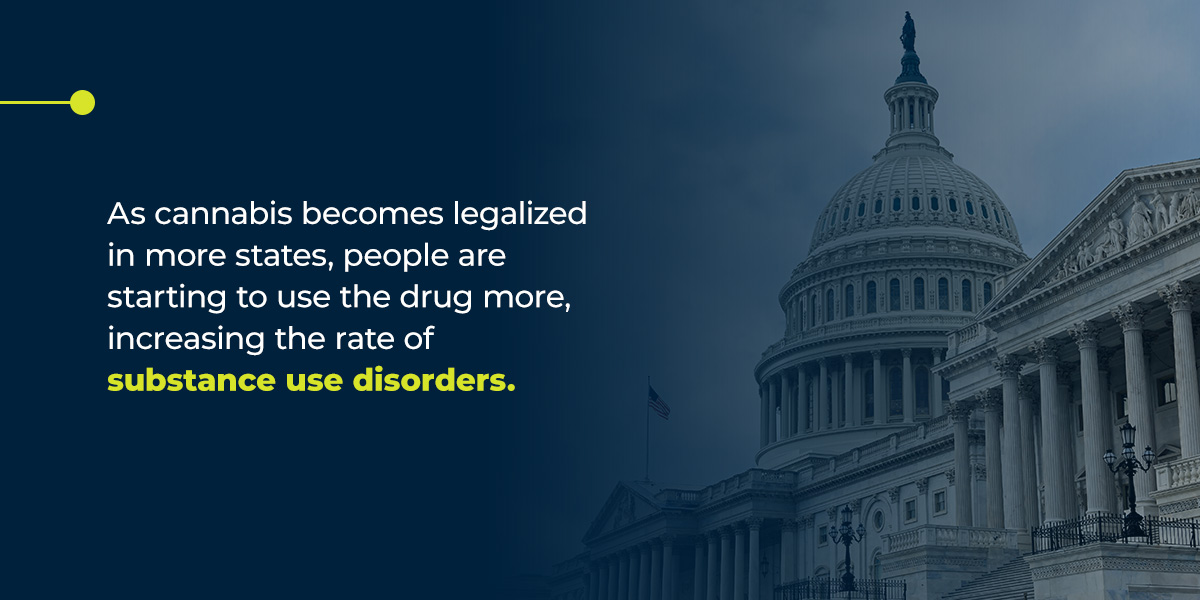
When a person uses cannabis, the THC affects the cannabinoid receptors in the brain and creates a “high” effect. While marijuana doesn’t always result in physical addiction, people can become addicted to the way it makes them feel and use it to cope with uncomfortable feelings or stressful situations. As cannabis becomes legalized in more states, people are starting to use the drug more, increasing the rate of substance use disorders.
Like other drugs, marijuana use disorders have noticeable signs, such as:
Marijuana addiction can be challenging to overcome, even if a person’s life is negatively affected. Cannabis also has physical and mental symptoms that can point to addiction, such as:
The various physical, mental and behavioral symptoms of marijuana addiction can impact a person’s quality of life. You can use these signs or symptoms to identify marijuana addiction in yourself or someone you love. If these signs or symptoms seem familiar, it may be time to seek professional treatment for substance abuse to improve your physical and mental well-being.
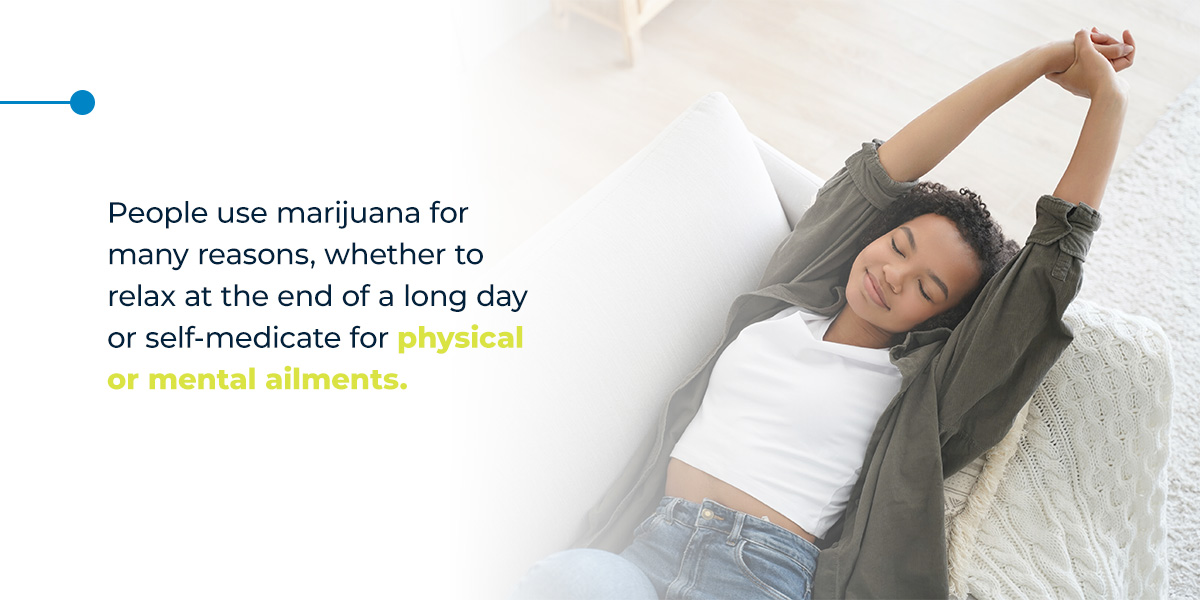
People use marijuana for many reasons, whether to relax at the end of a long day or self-medicate for physical or mental ailments. Once a person becomes addicted to marijuana, they’ll experience short- and long-term effects from the drug. Combing cannabis with alcohol, medications or drugs can increase the severity of the following effects.
Once a person smokes or ingests marijuana, THC enters the bloodstream and is delivered to the brain and the body’s organs. THC reacts with the cannabinoid receptors in the brain and creates a high. Some of the most common effects people feel when they use marijuana include:
A person can become addicted to this high or how it helps them escape from their reality for a moment. The high will last for a varied amount of time depending on how much you consume, whether you smoke or ingest the drug, your tolerance level, the percentage of THC and multiple other factors. A cannabis high can last anywhere between two to 24 hours.
The lack of coordination can also make a person more susceptible to falls or accidents that cause severe injuries. Marijuana use can also cause a person to engage in reckless behaviors, such as driving under the influence.
Long-term marijuana addiction has various effects on a person’s life.
Once marijuana use becomes a regular part of a person’s life, they might experience challenges in personal and work relationships. They might have difficulty keeping up with their responsibilities, whether it’s a work project or providing quality child care. Someone might experience financial stress since they’re using their extra funds to finance their addiction.
These lasting effects can create additional stress, which can cause a person to use marijuana more frequently. If a person increases their dose or frequency of use, their physical and psychological dependence on marijuana will increase.
Using marijuana constantly also poses health risks, especially if you smoke the drug. Smoking marijuana can compromise your respiratory system, making you more prone to lung infections or illnesses, like bronchitis or pneumonia. Marijuana addiction can also weaken your immune system, making it easier to get sick frequently.
Additional long-term health effects include:
Frequent marijuana use can also cause long-term brain damage. Smoking or ingesting marijuana during the years of development can cause permanent changes and impair a person’s ability to recall memories or information. Cannabis addiction can kill brain cells, which affects cognitive function.
The long-term effects of frequent marijuana use on mental health can also be detrimental to a person’s quality of life. If someone has existing mental health conditions before using marijuana, their symptoms can worsen. Marijuana increases anxiety levels in some people and can cause a temporary psychotic episode in high doses. People with schizophrenia who use cannabis can develop worsening symptoms and potentially even psychosis.
Ceasing marijuana use can significantly improve your symptoms and health. If you or a loved one is feeling the effects of cannabis addiction in your life, it could be time to seek treatment.


Marijuana addiction destroys lives. Get the support you need to help yourself or your loved one break free.
While some people think that marijuana addiction is impossible, research shows that 30% of people who use it have some addiction to the drug. Once you start using cannabis regularly, your brain becomes accustomed to the high and will desire it more and more each day. A person can become mentally and psychologically addicted to the drug’s effects and how it makes them feel. After a long period of use, they can become physically addicted to the substance.
Specific individuals are more likely to develop a marijuana addiction than others. Some risk factors for cannabis addiction include:


Gateway Foundation offers customized, evidence-based recovery plans to support your recovery and ongoing healing.
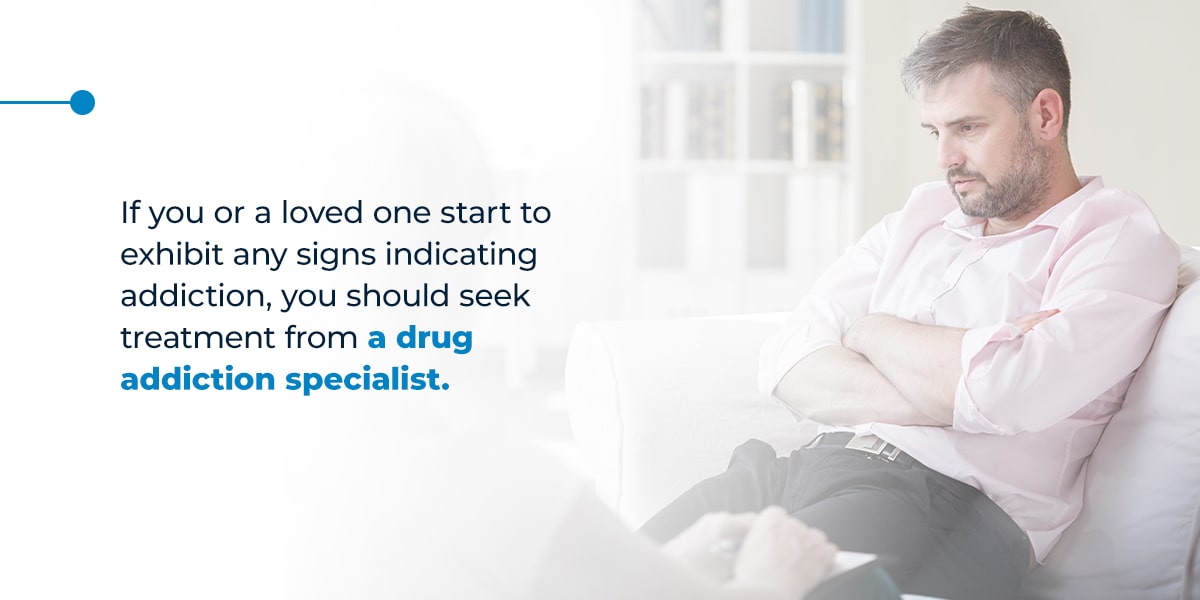
Since many people believe marijuana is harmless to their health and various states have legalized the drug, it can be challenging to determine when treatment is necessary. If you or a loved one start to exhibit any signs indicating addiction, you should seek treatment from a drug addiction specialist.
These signs include:
People addicted to marijuana have trouble quitting the drug despite the negative consequences. Those struggling with marijuana addiction aren’t failures or bad people. They’re simply dealing with a medical condition requiring professional help. If a loved one is struggling with cannabis addiction, do your best not to blame them for their addiction. Once a person becomes addicted to drugs, they can’t control their cravings and triggers before seeking professional help.
Calmly talk with them and emphasize that you care for their well-being. Remember that addiction is an illness, not a choice. Help your loved one understand how professional treatment can help improve their quality of life. A marijuana addiction treatment center can help you or a loved one understand how the addiction started and treat any underlying conditions contributing to the addiction.
Marijuana addiction can be challenging to manage, especially when a person believes that the drug isn’t harmful to their health. Seeking treatment from a professional addiction facility can help you or a loved one reframe your way of thinking and improve your well-being. If underlying mental health conditions contribute to addiction, you’ll be treated simultaneously for addiction and mental health.
There are various treatment options available for cannabis addiction, including inpatient and outpatient treatment. The level of care you need will depend on how long you’ve been using marijuana, your regular dose and the addiction’s severity. Your home environment may also play a part in your treatment since some people can’t avoid the drug in their personal lives while in treatment.
When you participate in an inpatient treatment program, you’ll stay overnight at the facility for the duration of your treatment. You’ll have access to withdrawal management and 24/7 care. Residential inpatient treatment is a good option for people who can’t escape marijuana at home, either because their family uses marijuana or they have friends who encourage their drug use.
Residential treatment allows you to recover in a sober environment with constant supervision. Your body will be able to detox from marijuana without gaining access to the drug and relapse. As you’re detoxing, you’ll participate in various treatments, such as group and individual therapy and recreational activities to help you clear your mind and get to the root of the addiction. You’ll also follow a structured routine that allows you to focus on your recovery and be required to make fewer decisions throughout the day.
The main difference between inpatient and outpatient treatment is that you can go home at the end of the day. Outpatient treatment programs are best suited to individuals who have a less severe addiction and responsibilities to maintain at home or work. There are different intensities of care in outpatient treatment, and the level of care you need will depend on your unique circumstances. Some people will attend treatment for the entire day, while others will participate in treatment for a few hours a week.
Many people prefer outpatient treatment due to its flexible nature. You can attend therapy on your schedule. For example, if you work during the day, you can participate in treatment in the afternoon to keep up with your work responsibilities.
Outpatient care utilizes many of the same practices as inpatient care. You won’t have access to the same level of supervision, but outpatient care is a good choice if you live in a sober environment and can manage your triggers or cravings while not at the treatment facility.
The main component of inpatient and outpatient treatment is therapy to help you overcome the underlying problems contributing to marijuana addiction. The psychological dependence on the drug is usually the most substantial factor in cannabis addiction. Various psychotherapies are used to heal the mind and restructure your way of thinking.
The different therapies used in marijuana addiction treatment include:


Don’t let your substance use disorder continue to wreak havoc on your life. Start your recovery today.
Marijuana addiction can have a severe effect on your physical or mental health. The longer a person uses a substance, the more severe these effects become. Professional treatment can help you quit cannabis and improve your life. When you seek professional treatment, you’ll follow a specific process to help you reach sobriety.
The process for marijuana addiction treatment is as follows:
Before you start treatment, an addiction specialist will assess your circumstances to determine what level of treatment you need. They’ll ask you questions about your marijuana use, such as how often you use the drug, what situations in which you use the drug most and the quantity of you use. They’ll also ask you questions about the first time you used marijuana to help determine the cause of your addiction.
You’ll also be asked questions about how cannabis use has affected your life. For example, an addiction specialist might ask you what your relationships are like or how you’ve been doing at work since you started using marijuana. Once they’ve determined the severity of your addiction, they’ll help you create a personalized treatment plan that would best suit your circumstances.
An addiction specialist will determine if you have any underlying conditions that need treatment during this stage. If they determine that you have an underlying mental health disorder, dual diagnosis treatment will be part of your treatment plan.
If you’ve been using marijuana for a long time, you might experience physical withdrawal symptoms as the drug leaves your body. Symptoms can start anywhere between one day to one week after you stop using marijuana. Some of the physical and mental withdrawal symptoms include:
If your withdrawal symptoms become uncomfortable or make it challenging to focus on your treatment, medical staff may provide medication to help you feel more comfortable and safe. Medication-assisted treatment suppresses uncomfortable withdrawal symptoms and allows you to focus on your recovery with a clear mind. You’ll be monitored by medical staff 24/7, ensuring your safety as you detox from marijuana.
As you detox, you’ll participate in various treatments to help you restructure your way of thinking. You’ll learn how addiction starts, how it affects your life and how you can overcome triggers and cravings to prevent a relapse. Various forms of treatment are available for cannabis addiction, including:
These are just a few of the therapies available to people to treat marijuana addiction. You’ll also have access to cognitive behavioral therapy, dialectical behavioral therapy, acceptance and commitment therapy and various other options to help you get to the root cause of your addiction and develop the skills to manage your emotions and triggers.
Addiction is a chronic illness that will require hypervigilance to sustain your recovery. The final step of the official marijuana addiction treatment process is after care planning. Once you’ve finished professional treatment, taking care of yourself is the best way to prevent a relapse. While you’re in treatment, you’ll work with an addiction specialist to start planning your after care.
Your after care plan will specifically outline your triggers and how you should react when you become stressed, emotional and feel a craving. You’ll also include a list of names and contact information of people from your support group who you can reach out to when you feel intense cravings or stress. Members of your support group can help remind you why it’s crucial to stay committed to sobriety and offer their help to distract you from your triggers.
You may also participate in a 12-step support group, which will help you connect to other individuals in various stages of their recovery. Connecting to other people will help you feel less isolated and allow you to discuss your concerns or challenges and ask questions. 12-step support groups are a vital tool for you to keep learning about yourself and your addiction even once you’ve completed official treatment.


Start your healing journey at Gateway Foundation with supportive, evidence-based treatment.
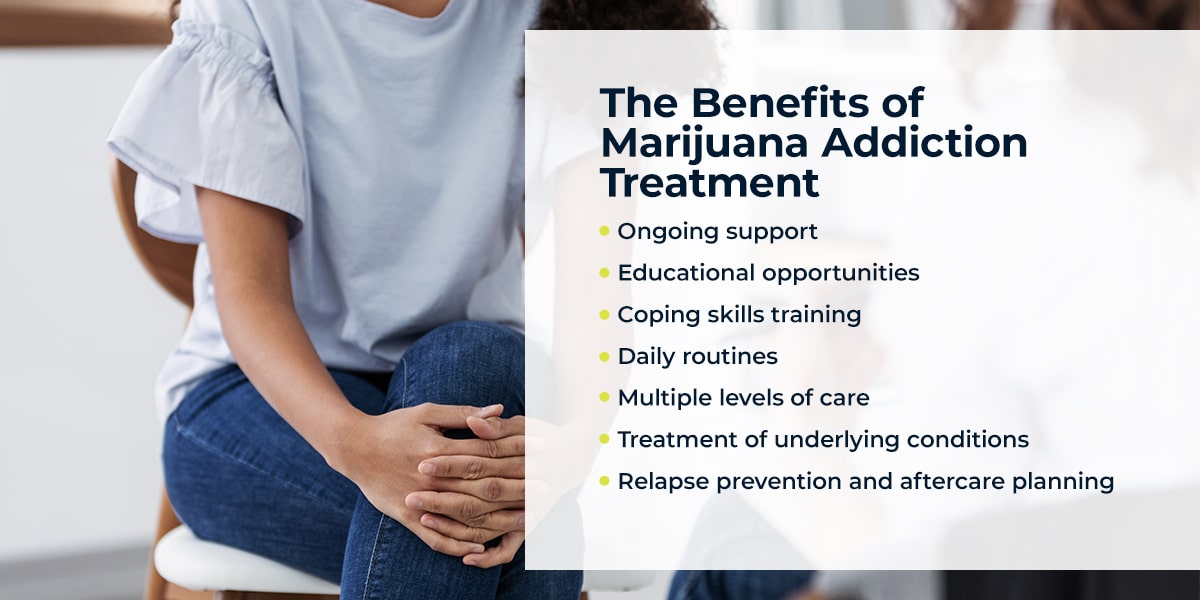
Cannabis addiction can be challenging to overcome, but seeking help from a professional treatment center can equip you with the tools and skills to succeed. There’s a reason why so many seek official treatment for addiction.
Some of the benefits of marijuana addiction treatment include:
Gateway was one of the best decisions of my life they truly saved me from the road I was headed down! I would love to thank the staff and of course my amazing counselor Adrain really helped me refocus my life on the right path without gateway I wouldn’t have made it thank you and I love this place I always come back to alumni meeting and events.
My family member just competed her 28 day stay she had a great experience the staff is wonderful and treated her with respect and went above and beyond to help her. Gateway saved my family members life. It was not easy finding a nice inpatient rehab and gateway made the whole process very smooth we are so thankful we found this facility. Thank you gateway.
Spent some time here and got some great tools to help me in my recovery. My counselors in the women’s unit were great and supportive. Love the monthly alumni meetings after treatment, great way to stay connected.
A little over 7 years ago I decided to seek treatment for alcohol and drug addiction and chose this facility as a place to try and arrest my disease and I have been clean and sober ever since. After 30 days inpatient treatment and 9 months outpatient I was able to achieve that goal. I recommend this facility to anyone who truly wants freedom from active addiction.
This place honestly saved my life. I was so bad my counselor said in the 2 years she was working there my case was the most unique she’s ever had, and now I’m almost 15 months clean!

Gateway was one of the best decisions of my life they truly saved me from the road I was headed down! I would love to thank the staff and of course my amazing counselor Adrain really helped me refocus my life on the right path without gateway I wouldn’t have made it thank you and I love this place I always come back to alumni meeting and events.
My family member just competed her 28 day stay she had a great experience the staff is wonderful and treated her with respect and went above and beyond to help her. Gateway saved my family members life. It was not easy finding a nice inpatient rehab and gateway made the whole process very smooth we are so thankful we found this facility. Thank you gateway.
Spent some time here and got some great tools to help me in my recovery. My counselors in the women’s unit were great and supportive. Love the monthly alumni meetings after treatment, great way to stay connected.
A little over 7 years ago I decided to seek treatment for alcohol and drug addiction and chose this facility as a place to try and arrest my disease and I have been clean and sober ever since. After 30 days inpatient treatment and 9 months outpatient I was able to achieve that goal. I recommend this facility to anyone who truly wants freedom from active addiction.
This place honestly saved my life. I was so bad my counselor said in the 2 years she was working there my case was the most unique she’s ever had, and now I’m almost 15 months clean!
If you’ve never been treated for addiction before, you likely have some questions. We’ve compiled a list of some of the most commonly asked questions about marijuana addiction to help you know what to expect when you enter treatment.
If you experience withdrawal symptoms while in treatment for marijuana addiction, you may be given medication to help you feel more comfortable to focus on your recovery. Various medications are used in medication-assisted treatment, including:
Each of these medications has various applications, and an addiction specialist will help you make the right choice based on your symptoms and needs. You may also be given an anti-anxiety medication if this is one of your uncomfortable symptoms. Let your specialist know if you’re taking any other medications for various health conditions or ailments so they can prescribe you medicine that doesn’t interact with anything you’re already taking.
Treatment will vary from person to person, as each individual’s recovery journey is a personal and unique experience. Your personalized treatment plan will outline the details of your specific treatment.
If you participate in an inpatient program, you’ll spend your days and nights within the facility. You’ll wake up at a set time to start your day and go to bed at the same time every night. Throughout the day, you’ll participate in various treatments according to your personalized plan.
You’ll meet with your therapist or attend a group therapy session to talk through your challenges with addiction. If you’re on a medication to assist with withdrawals, a medical staff member will administer the medication on a regular schedule and monitor your progress.
Outpatient treatment works a little differently. You might attend treatment eight hours a day or a few hours each week. Once you arrive at the facility, you’ll attend therapy sessions and group meetings to treat your addiction. You’ll go back home at the end of each day, where you can process everything you’ve learned and continue to make progress in your own environment.
Both inpatient and outpatient care follow a specific structure to help limit distractions and keep your mind focused on your recovery. You’ll learn skills to manage your triggers and overcome stress, mental condition and cravings.
Some people don’t seek treatment because they worry that their insurance won’t cover the costs. The Mental Health Parity and Addiction Equity Act (MHPAEA) requires that insurance providers offer the same level of care for mental health and addiction as they would physical ailments.
Keep in mind that some insurance providers are limited in what they offer. If an insurance policy has limited coverage for physical conditions, then mental health and addiction coverage will be the same. However, you likely have at least some addiction treatment coverage, so you won’t have to pay out-of-pocket for all of the costs.
Treatment times vary based on the individual since addiction is a unique experience for each person. Inpatient treatment usually lasts 30, 60 or 90 days. During your assessment, an addiction specialist will help you determine the length of your stay based on the severity of your addiction and the level of care you need to find success.
Outpatient treatment can last even longer for some people. Once you complete official treatment, you’ll likely still attend support group meetings or work with a therapist to continue to work on underlying mental health conditions or trauma. Staying committed to your recovery can help you maintain long-term sobriety.
If you’re looking to help your loved one through treatment, remember that your support is essential. Be honest about how their addiction is affecting your relationship and their life. Remind them that they’re not a bad person just because they have an addiction and you’ll help them through each step of the process. It’s often helpful to arrange treatment for your loved one since the process can be overwhelming for people who are struggling with addiction.
Gateway Foundation offers family support and programming to help you and your loved one navigate the addiction treatment process and work toward shared goals. Family support and programming can help you re-establish balance and showcase your dedication to your loved one’s recovery.
If you’re looking for a marijuana addiction treatment center in Chicago, Illinois, Gateway Foundation is here to provide you with high-quality care to help you overcome your addiction. We have helped many people in a similar situation improve their lives. Long-term cannabis use can be detrimental to your well-being, so it’s essential to seek treatment when you determine you have an addiction.
Our professional staff is dedicated to your care, and we offer multiple levels of treatment to suit your individual needs. Contact us today to learn more about our programs and services and how we can help you be free from addiction.
We use cookies to give you the best experience on our website. If you continue without changing your cookie settings, we assume that you consent to our use of cookies on this device. You can change your cookie settings at any time but if you do, you may lose some functionality on our website. More information can be found in our Privacy Policy.